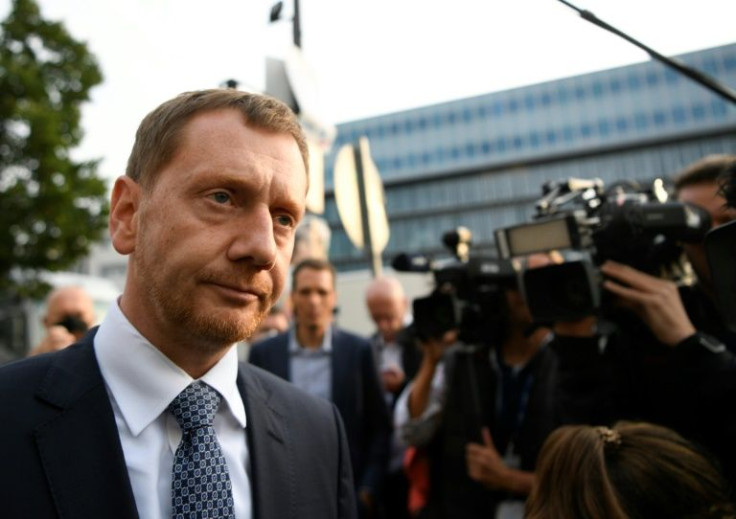Germany Vows To 'Defend Itself' As Police Raid Anti-vaxxers
Germany vowed Wednesday to "defend itself" against radicalised anti-vaccination groups after police launched raids in response to death threats against a top politician backing decisive measures to fight the pandemic.
Police and special forces staged an operation in Saxony after an anti-vaccine group targeted the region's state premier, who has vocally supported national measures against the unvaccinated in one of the areas of the country with the lowest inoculation rates.
Chancellor Olaf Scholz, who took office last week, said Germany would "not allow a tiny minority of uninhibited extremists to try to impose its will on the whole of society".
The security forces earlier launched the operation in the eastern city of Dresden following threats from an anti-vaccine group against state premier Michael Kretschmer.
"Statements from certain members of the group suggested they might have real weapons and crossbows," police said, without indicating if any arrests had been made.
Audio messages called for opposing "if necessary with weapons" the measures in place, targeting politicians and in particular, Kretschmer.
Authorities suspected "the preparation of a violent crime that threatens the state", police later said on Twitter.
The investigation was opened after journalists from public broadcaster ZDF infiltrated an encrypted Telegram chat and reported on the death threats last week.
ZDF revealed the contents of messages allegedly involving a hundred members of the chat group "linked by their opposition to vaccines, to the state and the current health policies", police said.
In his first speech to parliament as chancellor, Scholz vowed a zero-tolerance policy against such extremist groups.
Germany will "use all the means of its democratic rule of law to defend itself against this tiny minority of the hateful attacking the rest of us", he said.

A large, partly radicalised movement has emerged in Germany against health restrictions imposed during the Covid-19 pandemic.
It is particularly strong in Saxony, in former communist East Germany, one of the regions worst hit by the resurgent coronavirus and where the vaccination rate is lower than the national average.
At the beginning of December, protestors gathered outside the house of the Saxony state minister of health with torches and whistles, a demonstration which was condemned by politicians.
In the midst of a strong fourth wave of the virus, the national government decided to strengthen restrictions on unvaccinated people, banning them from public venues, restaurants and non-essential commerce.
Scholz has said compulsory vaccination could be voted on by parliament in the coming weeks, with the obligation to get the jab coming into force in February or March.
The number of individuals opposed to the health restrictions and prepared to use violence was between 15,000 and 20,000, security expert Sebastian Fiedler of Scholz's Social Democrats told the daily Bild on Tuesday.
The former East German states, including Saxony, are particularly fertile territory for the new fringe movement.
Public protests against the restrictions are almost daily and sometimes result in violence.
The president of Germany's conference of interior ministers, Thomas Strobl, has called for a strong response from the federal government.
Individuals who threatened the constitution "leave the common ground of our democracy and will be held to account using all the power's available under the rule of law," Strobl, the interior minister in the state of Baden-Wuerttemberg, told the Funke media group.
The Telegram messaging app at the centre of the police investigation has itself come under fire from the government.
"We have to act more resolutely against incitements to violence and hatred on the internet," the new federal interior minister Nancy Faeser said on Monday, noting that the messaging services were "subject to the same rules as Twitter or Facebook" to counter illegal content.
© Copyright AFP 2024. All rights reserved.




















